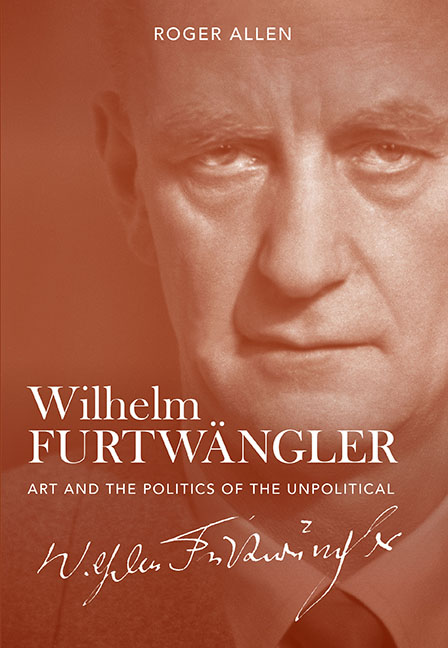Book contents
- Frontmatter
- Dedication
- Contents
- List of Illustrations
- List of Abbreviations
- Prelude
- Acknowledgements
- Preface
- Note on Translations
- Chronology
- Introduction
- 1 Wilhelm Furtwängler: The Historical, Cultural and Intellectual Background
- 2 Childhood and Youth (1886–1911)
- 3 Lübeck and Mannheim (1911–20)
- 4 Furtwängler in the Weimar Republic (1919–33)
- 5 Furtwängler and the Nazi State I (1933–35)
- 6 Furtwängler and the Nazi State II (1935–45)
- 7 Reflection and Reaction: Furtwängler in the Immediate Post-War Period (1945–50)
- 8 Furtwängler as Symphonist
- 9 ‘All Greatness is Simplicity’ (1951–54)
- 10 Afterword
- Appendix 1 Two Furtwängler Essays
- Appendix 2 Thomas Mann, ‘Germany and the Germans’ (1945)
- Appendix 3 Audio and Visual Sources
- Bibliography
- Index
- Frontmatter
- Dedication
- Contents
- List of Illustrations
- List of Abbreviations
- Prelude
- Acknowledgements
- Preface
- Note on Translations
- Chronology
- Introduction
- 1 Wilhelm Furtwängler: The Historical, Cultural and Intellectual Background
- 2 Childhood and Youth (1886–1911)
- 3 Lübeck and Mannheim (1911–20)
- 4 Furtwängler in the Weimar Republic (1919–33)
- 5 Furtwängler and the Nazi State I (1933–35)
- 6 Furtwängler and the Nazi State II (1935–45)
- 7 Reflection and Reaction: Furtwängler in the Immediate Post-War Period (1945–50)
- 8 Furtwängler as Symphonist
- 9 ‘All Greatness is Simplicity’ (1951–54)
- 10 Afterword
- Appendix 1 Two Furtwängler Essays
- Appendix 2 Thomas Mann, ‘Germany and the Germans’ (1945)
- Appendix 3 Audio and Visual Sources
- Bibliography
- Index
Summary
Wilhelm Furtwängler (1886–1954) is both a monument to a grand tradition and an example of how the phenomenon of the Great Man can distort the perception of history. The aim of what follows is therefore to penetrate the aura that presently surrounds the icon of a particular ‘Great Conductor’ and engage with the phenomenon he represented: that of an artist driven by an ideological world-view which determined everything he did and which drove him to extremes of both perversity and greatness.
Furtwängler has entered the historical memory primarily as a supreme interpreter of the central repertoire of the Austro-German canon of musical masterworks. His extensive legacy of sound recordings, whether captured live through radio broadcasts or made in the studio, are the main routes of access to his art. They are now almost universally available and are regularly remastered and reissued in various formats. As a body of work these recordings are freighted with historical meaning: for the historian of performance they are a direct record of past orchestral and operatic practice; for the cultural historian, the live recordings in particular document significant historical events, for example the 1936 Bayreuth Festival, concerts given during the war years (such as Beethoven's Ninth Symphony given in Berlin on 22 March 1942), or those from the period after the defeat of Germany in 1945 when Furtwängler was permitted to resume his conducting activities following the conclusion of de-Nazification proceedings. The catalogue is far too extensive for even a cursory treatment to be remotely comprehensive. Representative examples taken from the relevant period will nevertheless here be examined as primary historical evidence.
Film sources of Furtwängler are limited but also of considerable value. The image showing the conductor shaking hands with Goebbels following the conclusion of the last movement of Beethoven's Ninth Symphony on the eve of Hitler's birthday on 19 April 1942 is a powerful reminder of how the Nazis made propaganda out of art. Furtwängler conducting Wagner's Meistersinger overture as part of a 1942 Strength through Joy (Kraft durch Freude) film before a rapt audience of seemingly absorbed industrial workers brought Wagner out of the opera house and onto the factory floor as a means of cultural morale-boosting.
- Type
- Chapter
- Information
- Wilhelm FurtwänglerArt and the Politics of the Unpolitical, pp. xv - xxPublisher: Boydell & BrewerPrint publication year: 2018



